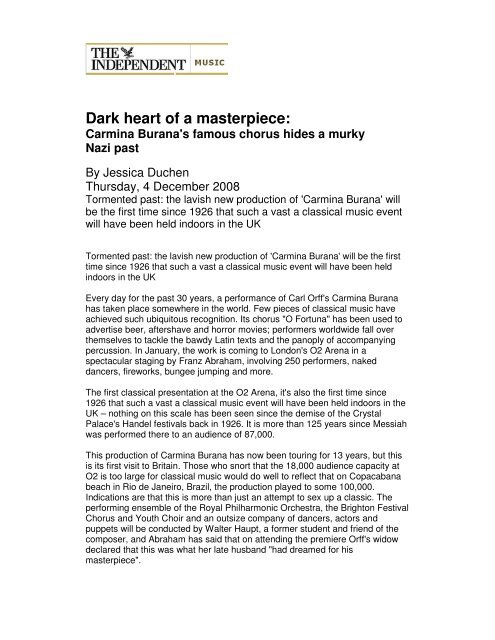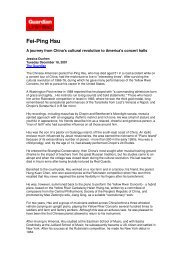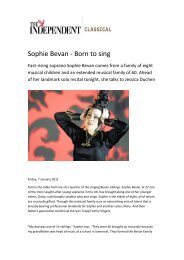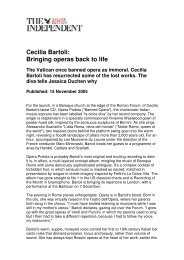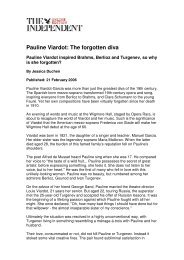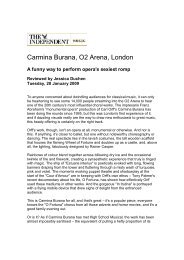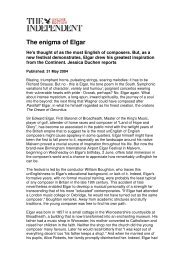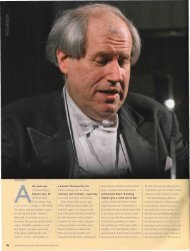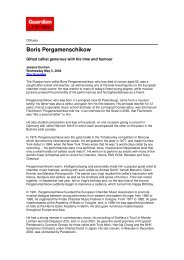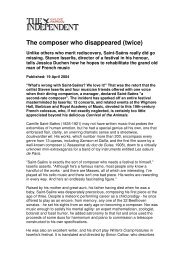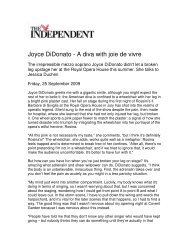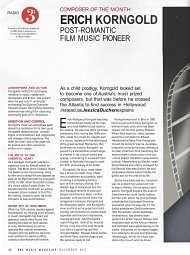Dark heart of a masterpiece: Carmina Burana's ... - Jessica Duchen
Dark heart of a masterpiece: Carmina Burana's ... - Jessica Duchen
Dark heart of a masterpiece: Carmina Burana's ... - Jessica Duchen
You also want an ePaper? Increase the reach of your titles
YUMPU automatically turns print PDFs into web optimized ePapers that Google loves.
<strong>Dark</strong> <strong>heart</strong> <strong>of</strong> a <strong>masterpiece</strong>:<br />
<strong>Carmina</strong> <strong>Burana's</strong> famous chorus hides a murky<br />
Nazi past<br />
By <strong>Jessica</strong> <strong>Duchen</strong><br />
Thursday, 4 December 2008<br />
Tormented past: the lavish new production <strong>of</strong> '<strong>Carmina</strong> Burana' will<br />
be the first time since 1926 that such a vast a classical music event<br />
will have been held indoors in the UK<br />
Tormented past: the lavish new production <strong>of</strong> '<strong>Carmina</strong> Burana' will be the first<br />
time since 1926 that such a vast a classical music event will have been held<br />
indoors in the UK<br />
Every day for the past 30 years, a performance <strong>of</strong> Carl Orff's <strong>Carmina</strong> Burana<br />
has taken place somewhere in the world. Few pieces <strong>of</strong> classical music have<br />
achieved such ubiquitous recognition. Its chorus "O Fortuna" has been used to<br />
advertise beer, aftershave and horror movies; performers worldwide fall over<br />
themselves to tackle the bawdy Latin texts and the panoply <strong>of</strong> accompanying<br />
percussion. In January, the work is coming to London's O2 Arena in a<br />
spectacular staging by Franz Abraham, involving 250 performers, naked<br />
dancers, fireworks, bungee jumping and more.<br />
The first classical presentation at the O2 Arena, it's also the first time since<br />
1926 that such a vast a classical music event will have been held indoors in the<br />
UK – nothing on this scale has been seen since the demise <strong>of</strong> the Crystal<br />
Palace's Handel festivals back in 1926. It is more than 125 years since Messiah<br />
was performed there to an audience <strong>of</strong> 87,000.<br />
This production <strong>of</strong> <strong>Carmina</strong> Burana has now been touring for 13 years, but this<br />
is its first visit to Britain. Those who snort that the 18,000 audience capacity at<br />
O2 is too large for classical music would do well to reflect that on Copacabana<br />
beach in Rio de Janeiro, Brazil, the production played to some 100,000.<br />
Indications are that this is more than just an attempt to sex up a classic. The<br />
performing ensemble <strong>of</strong> the Royal Philharmonic Orchestra, the Brighton Festival<br />
Chorus and Youth Choir and an outsize company <strong>of</strong> dancers, actors and<br />
puppets will be conducted by Walter Haupt, a former student and friend <strong>of</strong> the<br />
composer, and Abraham has said that on attending the premiere Orff's widow<br />
declared that this was what her late husband "had dreamed for his<br />
<strong>masterpiece</strong>".
But now the tormented history <strong>of</strong> Orff himself has become the subject <strong>of</strong> a new<br />
documentary by Tony Palmer. His film O Fortuna, which premieres at the<br />
Barbican in London on Sunday, carries a message no less spectacular in its<br />
own way, but far more sober: Carl Orff effectively sold his soul to Hitler's<br />
henchmen, and paid the price in his conscience for the rest <strong>of</strong> his life.<br />
The film contains much that will shock fans, as well some phenomenal twists <strong>of</strong><br />
fortune. Orff emerges as a highly complex man who, according to the third <strong>of</strong><br />
his four wives, Luise Rinser, "found it impossible to love" and "despised<br />
people", habitually using, then discarding those close to him. He would <strong>of</strong>ten<br />
wake in the night, screaming, and would tell her, "I have seen the Devil." She<br />
adds: "If he had been a less great person, he would have gone mad.<br />
Nevertheless, there is madness in his music." Orff's only child, Godela, gives a<br />
candid account <strong>of</strong> a father whom she declares did not want her and had no<br />
place for her in his existence. But the catalogue <strong>of</strong> lies, deception and<br />
<strong>heart</strong>lessness goes back to the very beginning.<br />
It turns out that Orff, who was born in Bavaria in 1895, had a Jewish<br />
grandmother – a fact that, extraordinarily, he managed to conceal from the<br />
painstaking research <strong>of</strong> the National Socialists. "Once you tell one lie to cover<br />
up a lethal situation – one Jewish grandparent was enough to condemn you to<br />
death – it's a slippery slope," comments Tony Palmer. "Ever more must be done<br />
to maintain the deception."<br />
The lies went on. Orff later claimed that the Nazis had banned <strong>Carmina</strong> Burana.<br />
Nothing could have been further from the truth – they adored it, and no wonder.<br />
Its simplicity, accessibility and primal force exemplified the opposite <strong>of</strong> the<br />
atonal or serialist works that the regime deemed "decadent" (entartete musik).<br />
Indeed, the work – premiered for the Nazi party in 1937 – helped to draw Orff to<br />
their attention and won him support from the Reich. Nor was he above writing<br />
new incidental music to A Midsummer Night's Dream when the much-loved<br />
work by the Jewish Mendelssohn was banned.<br />
Orff, however, was never a card-carrying member <strong>of</strong> the Nazi party and<br />
privately despised them for their crudity and philistinism. "He wasn't interested<br />
in politics," his second wife, Gertrud, recalls in the film. She adds that the war<br />
was "not our fault", but that they did not protest because it "wasn't safe".<br />
It is telling that one <strong>of</strong> the works closest to Orff's <strong>heart</strong> was a Märchenopera<br />
(fairy-tale opera) that he wrote in 1939: Der Mond, telling <strong>of</strong> a world plunged into<br />
darkness when fiends steal the moon. It contains some <strong>of</strong> his most appealing<br />
music, but proved unstageable except by a puppet theatre. Many artists,<br />
comments the historian Michael H Kater, felt that "the regime had stolen the<br />
light" from them. Still, it was not difficult for the previously penniless and<br />
struggling Orff to see that the Reich had high hopes for him. By 1943, his name<br />
was on a special list <strong>of</strong> favoured artists; he was not to be conscripted, he<br />
received a 2,000-mark prize from the Cultural Chamber in 1942 and he was<br />
placed on an elite payroll that gave him 1,000 marks per month. Germany's two<br />
senior composers, Richard Strauss and Hans Pfitzner were ageing and would<br />
soon die; it was clear that if Germany were to win the war, Orff would quickly<br />
become the Reich's leading composer.
One can argue that, like so many living under insane and tyrannical regimes,<br />
Orff merely did what was necessary in order to survive. And perhaps it was his<br />
good fortune that when he found himself facing the "de-Nazification" process<br />
after Germany's defeat, his interrogator was a musically educated admirer. This<br />
American intelligence <strong>of</strong>ficer, keen to help him, asked him simply to provide<br />
something, anything, that could show he had spoken out against Hitler.<br />
Orff's invented response at this moment would never cease to haunt the<br />
composer.<br />
Kurt Huber, pr<strong>of</strong>essor <strong>of</strong> philosophy at Munich University, had provided Orff with<br />
the medieval Latin texts that he set in <strong>Carmina</strong> Burana; the two had also worked<br />
together on Der Mond. In 1942, Huber and a core group <strong>of</strong> students formed the<br />
White Rose resistance movement which distributed pamphlets calling for active<br />
opposition to the Third Reich. Huber authored the sixth and final leaflet. Huber's<br />
widow, Clara, relates on camera that Orff was a close friend and used to visit<br />
them every Sunday. Yet, she adds, he had no part in the movement and never<br />
said a word against Hitler.<br />
On the contrary, the day after Huber's arrest by the Nazis, when she told Orff<br />
what had happened, his response was: "I am ruined! Ruined!" She hoped he<br />
would use his influence to intervene on her husband's behalf; but Orff did<br />
nothing. "He thought only <strong>of</strong> himself," she recalls. She never saw him again.<br />
Put on the spot by the de-Nazification interrogator, Orff falsely claimed that he<br />
had co-founded the White Rose movement with Huber. The group's members,<br />
including Huber, had been executed in 1943. Nobody was left alive to dispute<br />
his words and he walked out with a clear name. He only had to answer to his<br />
conscience.<br />
Among Orff's papers, Michael Kater discovered a document in the composer's<br />
handwriting, addressed to the deceased Huber: a letter recalling their good<br />
times and begging forgiveness. It appeared to be Orff's private, desperate<br />
attempt to work through his guilt over betraying his friend. Perhaps it is no<br />
coincidence that Orff's later works included settings <strong>of</strong> Greek tragedies, for<br />
example, Antigonae and Oedipus, in which guilt and the unforgiving nature <strong>of</strong><br />
fate are recurrent themes.<br />
Orff, though, has experienced an astonishing posthumous redemption. In 1924-<br />
1925 he co-founded the Günther-Schule for music and dance in Munich. There,<br />
with half an eye on the Hitler Youth, he devised a new approach to musical<br />
education entitled Schulwerk – literally, "schoolwork". Its central concept is that<br />
every child is musical and that each individual can become free to express himor<br />
herself musically through learning simple rhythms on percussion instruments,<br />
playing and singing in groups, and building confidence through imagination and<br />
creative thinking. "When we lose our fantasy," said Orff, "we are lost."<br />
The Hitler Youth turned up its nose at Schulwerk. But in time, Orff's ideas<br />
proved strikingly effective; today they are passionately advocated by musical<br />
educationalists the world over.
Palmer has filmed Orff Schulwerk classes in China, Taiwan, the townships <strong>of</strong><br />
South Africa and, harrowingly, a music therapy group in Nottingham for children<br />
with cerebral palsy. Whatever Orff's personal failings, he devised a system that<br />
is now improving the lives <strong>of</strong> ailing children who, under the Third Reich, would<br />
have been condemned to death.<br />
Orff died in 1982 and was buried in the monastery at Andechs on Bavaria's<br />
"holy mountain". Fortune may have been merciless to him in his own mind, but<br />
in the musical world it has smiled lavishly upon him, and continues to do so.<br />
"The good man," said Orff, "is the one who begins again, with his ideas and his<br />
life."<br />
Tony Palmer's 'O Fortuna' is at the Barbican Cinema, Silk Street, London EC2<br />
on Sunday at 6pm (020-7638 8891; www.barbican.org.uk). '<strong>Carmina</strong> Burana' is<br />
at the O2 Arena (0844 856 0202; www.theo2.co.uk) on 17 and 18<br />
January.Media partner: 'The Independent'


